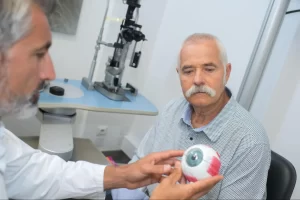Have you ever popped in your contact lenses and, instead of getting through the day with crisp vision, found yourself developing headaches by the end of it? You’re not alone—contact lens wearers often wonder, “Can contacts give you a headache?” While you might think once you’ve got the right vision correction, you’re in the clear, sometimes headaches sneak in, and you’re left frustrated.
Don’t worry, though! We’re about to dive into some reasons this happens. We’ll sort it out together—because clear vision shouldn’t come at the cost of headaches.
A closer look at the link between lenses & headaches
“Can contacts really give you a headache?”
Yes, and several factors could be behind it, including:
Incorrect contact lens prescription
Even the smallest change in your prescription can trigger headaches. If your vision doesn’t feel sharp, your eyes will constantly adjust, leading to strain. If you haven’t had an eye exam recently, it’s worth scheduling one to check for any updates to your prescription.
Toric contact lenses & astigmatism
If toric lenses aren’t properly fitted or aligned, unclear vision can lead to additional strain and headaches by day’s end.
Extended wear lenses & dry eyes
Wearing contacts for several hours or even sleeping in them can cause dry eyes. Without enough tears or oxygen getting through to your eyes, they can dry out—leading to irritation and discomfort, which often triggers headaches.
Switching to silicone hydrogel lenses or taking more breaks could help keep your eyes moist and prevent headaches. If you’re struggling with this issue, consider looking into dry eye treatment to alleviate symptoms and protect your eye health.
Blurry vision & eye strain
Blurry vision is a clear sign something’s wrong. Whether it’s due to a poor prescription, a bad lens fit, or dirty lenses, your eyes work overtime to focus, leading to strain and headaches. Don’t ignore this—it’s time to visit your eye doctor or consider new lenses.
Corneal issues & astigmatism
Your cornea plays a major role in your vision, especially if you have astigmatism. If your contacts don’t fit your cornea properly, you could experience blurry vision and discomfort—leading to headaches. Toric lenses are designed to help, but they need to fit just right.
Vision changes in your 40s
As you enter your 40s, your vision naturally changes. Presbyopia, which affects your ability to see up close, often kicks in, making it harder to focus. If you’re struggling to see things nearby, it could be time for an updated prescription to keep your vision sharp.
Don’t let headaches disrupt your day. Schedule an eye exam with 414 Eyes today and let us help you find the perfect contact lens fit for clear, comfortable vision.
Solutions for avoiding headaches while wearing contacts
Now that you know the answer to, “can contacts give you a headache?” is YES, here are a few practical solutions to keep both your eyes and your head feeling good.
Ensure the correct prescription
One of the easiest ways to avoid headaches is by having an up-to-date contact lens prescription. Your eyes can change without you noticing, and wearing the wrong prescription leads to strain. Regular eye exams are crucial for keeping your vision sharp and headache free.
Choose the right lens type
The type of lens you wear matters. If your lenses aren’t the right fit for your eyes or lifestyle, headaches might follow. Whether you need soft lenses, hard lenses, or toric lenses for astigmatism, finding the best option is essential. Talk with your eye doctor to find the perfect match.
Proper lens care & maintenance
Clean lenses are happy lenses. Dirty contacts can cause irritation, infections, and headaches. Keeping your lenses clean and properly stored will prevent discomfort and keep your vision clear.
Consider switching between contacts & glasses
Giving your eyes a break can go a long way. If you wear contacts all day, switching to glasses in the evening can help prevent headaches. It’s a simple change that gives your eyes time to rest and recover.

At the same time, to keep your eyes healthy:
- Avoid wearing contacts for too long, especially if you often experience headaches
- Use eye drops to keep your eyes hydrated throughout the day
- Stick to a regular cleaning routine for your lenses and case
- Replace your lenses as recommended by your doctor
When to see an optometrist
Your eyes work hard every day, and ensuring they’re properly cared for can prevent more serious issues down the road. You should schedule yearly appointments with your optometrist, more so if:
- You’re experiencing headaches while wearing contact lenses, especially after long periods
- Your vision becomes blurry, whether when viewing nearby objects or at a distance
- You notice other symptoms like dryness, irritation, or discomfort when wearing your lenses
- You’re over the age of early forties and develop presbyopia or have trouble focusing on nearby objects
- It’s been more than a year since your last eye exam, and you’ve noticed short-sightedness or far-sightedness getting worse
- You have concerns about glaucoma management or notice any related symptoms like loss of peripheral vision
Keep in mind that figuring out the answer to “can contacts give you a headache?” is just one aspect of your overall eye comfort. Headaches caused by contact lenses tend to happen when something isn’t quite right, whether it’s your contact lens prescription or the fit of your lenses.
Don’t ignore these signs, as they could lead to other complications. Regular checkups with your optometrist help keep your vision sharp and your eyes healthy.
See clearly & comfortably with 414 Eyes
At 414 Eyes, we understand how frustrating it can be to experience headaches from wearing contact lenses. Our dedicated team is here to help you find the right solution, whether it’s adjusting your contact lens prescription or switching to lenses that are better suited for your eyes. We offer comprehensive eye exams that go beyond basic vision correction, ensuring that your contacts fit comfortably and help you see clearly without causing strain.
Whether you’re dealing with dry eyes, blurry vision, or headaches, our experienced optometrists will guide you through every step to improve your comfort and eye health. You don’t have to live with the discomfort—schedule an appointment with us, and let us help you see the world clearly and headache free.
Experience the relief you deserve! Schedule your comprehensive eye exam at 414 Eyes today and discover how our personalized solutions can help you see clearly and comfortably!
FAQs
How can I tell if my contact lens prescription is incorrect?
If you frequently experience headaches, blurry vision, or discomfort while wearing your contacts, it may indicate your prescription is incorrect. Other signs include difficulty focusing on nearby or distant objects and eye fatigue after short periods of wear. Regular eye exams are crucial to ensure your prescription is up to date and appropriate.
Do certain contact lenses help prevent headaches?
Silicone hydrogel lenses allow more oxygen to reach your eyes, potentially reducing discomfort and the likelihood of headaches compared to other types.
Is there a connection between dry eyes and headaches when wearing contacts?
Yes, dry eyes can lead to discomfort and strain, resulting in headaches while wearing contact lenses. This discomfort can be exacerbated if you’re using reading glasses for close-range tasks.
When should I switch from contacts to glasses to prevent headaches?
Switching from contacts to reading glasses in the evening or during long periods of close-range use can give your eyes a break and help prevent headaches.
How often should I replace my contact lenses to avoid headaches?
Follow your eye doctor’s recommendations for lens replacement. Regularly replacing your contact lenses can help prevent irritation and headaches.



